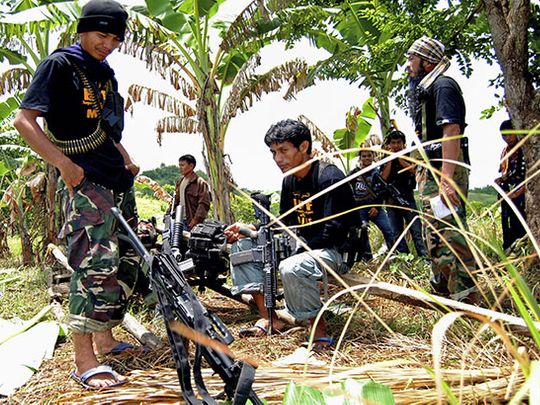
Manila: President Rodrigo Duterte distributed relief assistance to survivors of a massive blaze in Jolo, Sulu, and took the opportunity to renew his call to the Abu Sayyaf militant group to submit to the law.
According to reports, some 30,000 residents lost their houses in the fire that ravaged the coastal areas of Busbus, Walled City and Lambayong in Jolo last Tuesday.
Duterte, who visited Jolo last Friday, ordered that each affected family be given 15,000 pesos in financial assistance even as the local administration provided food assistance and also put up a community kitchen for the survivors.
Duterte promised the blaze survivors that new houses will be built for them as soon as the local government could identify a relocation site.
The mass housing project will be similar to the ones being constructed in Marawi City.
Duterte claimed that the improving the local economy could enhance regional peace and security.
“I can order that barter trade be restored as long as you follow the rules, simple as that,” he said.
There had been a thriving barter trade between Sulu, Zamboanga and Malaysia until the 1970s, resulting in relative prosperity in the region. However, the outbreak of the conflict spurred by the secessionist movement led by the Moro National Liberation Front plunged the region into poverty and its effects are still being felt on the economic and security front until now.
During his visit to Jolo, Duterte took the opportunity to appeal to members of the Abu Sayyaf to make peace. “My message to the Abu Sayyaf is: ‘I come in peace,’” he said.
The Abu Sayyaf has dwindled from a group with avowed political and ideological objectives to weaken the governance structure in Sulu, Tawi-Tawi and Basilan, into a loose and disparate band of armed men reduced to banditry. The group’s name, although it still evokes fear, now seems to be a generic term that refers to lawless groups fighting the government in the region.
The Abu Sayyaf had been blamed for kidnap for ransom incidents involving local businessmen, foreigners and even poor townsfolk.
Duterte repeated his call for the Abu Sayyaf to enter into negotiations for peace. He issued the same appeal to them when he visited Sulu last March.
Some of the Abu Sayyaf operatives are sons of former members of the MNLF, the separatist group that has already made peace with the government.
The Abu Sayyaf announced itself in 1995 with a raid in the municipality of Ipil in what is now in Zamboanga Sibugay.











